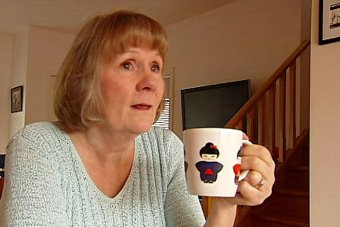Melbourne researchers have discovered a genetic trigger for breast cancer in a breakthrough that will help predict the spread of the disease and allow more targeted treatment.
The research team has won an international race to identify the gene, called PIPP, and the findings were published today in the US journal Cancer Cell.
It all started with then PHD student Lauren Binge.
Having lost her grandmother to cancer, she began an eight-year scientific quest for answers.
Team member Lauren Binge was a PHD student when her grandmother contracted breast cancer, and she spent the next eight years seeking answers.
“I have a strong family history of breast cancer and I was always really interested in the molecular mechanism of how a cell goes from a normal cell to a cancer cell,” she said.
Cancer is like this massive jigsaw puzzle. We’re all putting one little piece into the puzzle then we can finally see what the true picture is.
Professor Christina Mitchell, Dean of Medicine, Monash University
“We’ve identified a tumour suppressant protein that could potentially be screened in cancer patients.
“We can target therapies to them for those really aggressive cancers that have a poor prognosis.”
Ms Binge handed her research over to Dr Lisa Ooms, the author of the study published today.
The Australian researchers have beaten US and European labs to the world-first finding.
“It’s important because breast cancer metastasis, or spread, is the leading cause of breast cancer death,” Dr Ooms said.
“So understanding how breast cancer grows and spreads is really important for patients in the future.”
The research shows that if breast cancer patients do not have the PIPP gene, their prognosis is worse.
Tumour suppressant protein discovered
The Dean of Medicine at Monash University, Professor Christina Mitchell, said doctors struggled to treat patients when their cancer spread.
“We can have quite long illnesses where they are dealing with spread of cancer to their bones, to their brain, over a considerable period of time,” she said.
“If we can prevent that spread initially or reduce the spread, that gives us much better clinical outcomes for the patients involved.
“Cancer is like this massive jigsaw puzzle.
“We’re all putting one little piece into the puzzle then we can finally see what the true picture is.”
Vivienne Gorman had chemotherapy, radiotherapy and an eventual mastectomy when her cancer was worse than first thought.
She is hopeful the new discovery will lead to genetic testing for patients like her and a clearer diagnosis.
“I think the initial fear is, oh, this is terrible,” she said.
“I think if you could have a more positive look about it and they say well look, this is not going to damage you too much, we can treat it this, we we can target, it I think that would be fantastic.”
With 42 Australian women diagnosed with breast cancer daily, the discovery will make the spread of their cancer more predictable and treatment more targeted, but clinical use is 5 to 10 years away.


